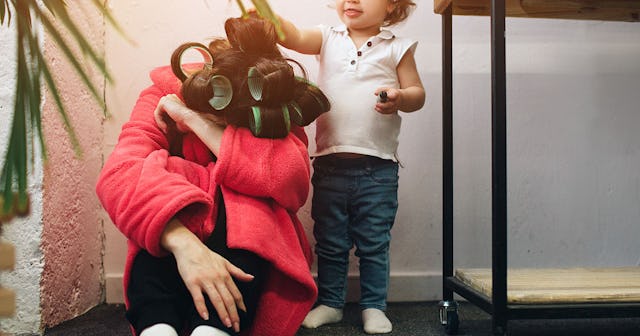We Call Bullsh*t On This Study That Says Moms Get 9 Hours Of Sleep Each Night

A new study found that parents on average get over 8 hours of sleep and LOL no
Any parent, mother or father, who saw this study would laugh out loud, and then cry, and then laugh some more.
Conducted by a mattress company (that’s red flag number one — studies should be published in journals or presented at conferences or both), it found that moms and dads get differing amounts of sleep depending on their circumstances, such as number of children, age of children, income, and employment. But generally, it found that everyone, from moms working multiple jobs to dads with five kids, are clocking over 8 hours of sleep a night, with many getting nine or ten.
To that we say: on what planet?
To that we say: excuse me?
To that we say: bullshit. There is no way your average mom with five children is snoozing for nine hours a night, or that parents holding down multiple jobs are still pulling in 8.1 hours each night.
So, we looked at the fine print that goes along with the data, and some other studies to make sure we weren’t going mad.
Image via Amerisleep.
First of all, the study emphasizes that the data is taken from the American Time Use Survey (ATUS), a nationally representative study of individuals’ schedules that is released each year. But this isn’t a super-specific study when it comes to sleep. They admit that they’re just tracking “sleeping activities,” which includes but is not limited to “falling asleep, dozing off, napping, getting up, waking up, dreaming, catnapping, getting some shut-eye, and dozing.” It also includes “insomnia, tossing and turning, lying awake, and counting sheep.”
Oooohhhh. Well, that makes much more sense. That means it also includes stuff like, getting up to nurse/feed your child, nursing your child in bed, sleeping with a toddler who kicks you a lot, worrying about bills, being in bed and playing Candy Crush with the light off, falling asleep for five minutes while your kids watch PJ Masks, falling asleep while your children jump up and down on you, laying awake worrying that your teen is trying pot at a sleepover, falling asleep while trying to watch Fleabag for ten minutes after bedtime, and waking up to change peed on/pooped on/vomited on bed sheets.
So, okay, we see what they’re saying: if you count the time we spend in bed, whether asleep or not, plus the time we spend awake caring for our kids at night after we’ve officially gone to bed, plus the times we accidentally fall asleep during the day because we’re exhausted, then yes, that probably adds up to nine hours. Whew.
To get the real scoop on how long moms and dads rest each day, there are some much better studies out there, conducted by actual researchers and published in real journals. And they all agree that moms and dads aren’t getting the proscribed eight hours a night. Most are woefully sleep deprived.
Like, this one, published in Medical News Today, found that parents lose an average of six months of sleep during their child’s first two years – and that 60 percent are not logging more than 3.25 hours of real snoozing each night for the first 24 months. Now we’re talking.
Another study, published in the scientific journal Sleep, found that parents’ sleep was significantly affected for the first six years of their child’s life, and that at best, the hours hovered between about six and seven, depending on the family’s circumstances and the age of the kids. This study also found that quality of sleep is affected — sleeping for a long stretch in a dark and quiet room is different from sleeping with a baby hanging off your nipple at 4 PM with the television on in the background for your toddler — something that the mattress study doesn’t touch.
So, don’t let this study gaslight you into thinking you are well-rested, or make you wonder if you’re the only one dragging your exhausted husk of a body around all day as you work and care for your kids and home. It’s just not true. Chances are, scientifically, if you have kids, you’re not getting enough sleep.
We should also acknowledge: sleep deprivation in parents is a problem that impacts our mental health, our work, our parenting, and our kids. Realizing it’s a problem, and that we’re not at all well-rested, is the first step toward finding a solution for it.
This article was originally published on